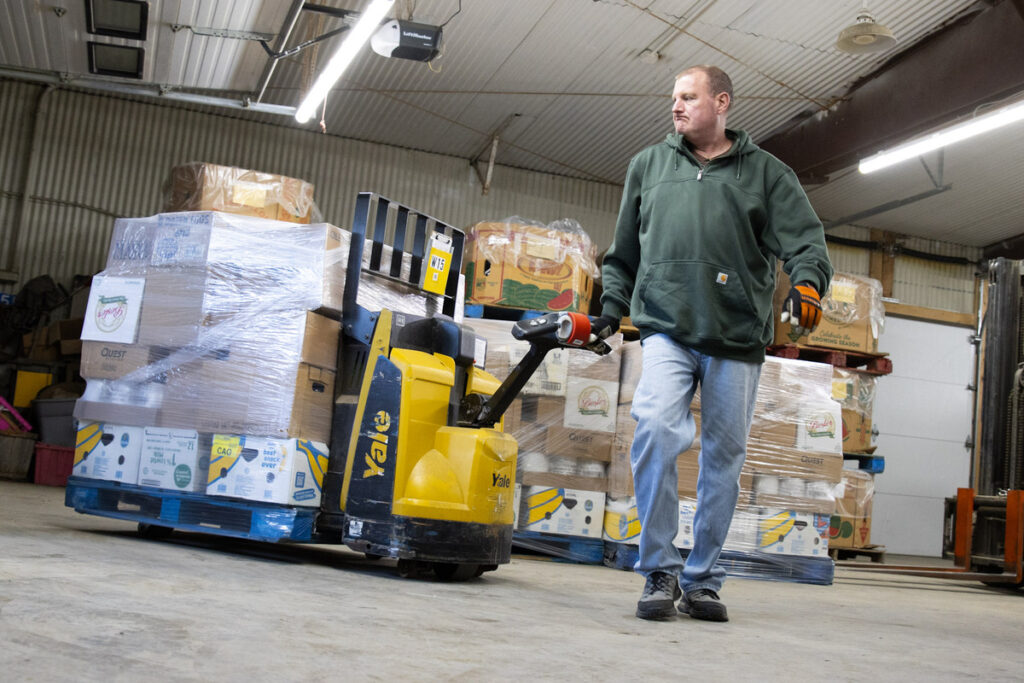
Food pantries in Maine are gearing up for a potential crisis as the federal government shutdown enters its fourth week, threatening vital benefits from the Supplemental Nutrition Assistance Program (SNAP). If the shutdown continues, more than **170,000 Mainers** may face a lapse in support for purchasing groceries starting in **November 2023**.
Jon Blanchard, director of hunger and relief services at **Catholic Charities**, is overseeing the distribution of food at their Monticello food bank. On a recent Thursday morning, he unloaded pallets filled with rice, tomatoes, apricots, and cereal, which will support over two dozen pantries across **Aroostook County** and parts of northern **Penobscot** and **Washington counties**. Catholic Charities typically distributes between **110,000 and 145,000 pounds** of food each month, but the impending SNAP funding lapse raises concerns about meeting increased demand.
Rural regions, particularly Aroostook County, have a high enrollment in SNAP, making them particularly vulnerable. “There isn’t a program that can replace that,” Blanchard stated, emphasizing the critical role food pantries will play if SNAP benefits are halted. Volunteers at various pantries are already noticing a squeeze on supplies due to earlier cuts to key **USDA** programs.
In **March 2023**, approximately **$500 million** was cut from **The Emergency Food Assistance Program (TEFAP)**, which provides food assistance to communities. Additionally, the **Local Food Purchase Assistance Cooperative Agreement Program** was discontinued, further straining resources. Rena Kearney, a volunteer at the **Mars Hill Community Cupboard**, noted a significant reduction in food supplies: “Before we were getting maybe four or five cases of something, and now we’re getting only maybe one case.”
At the **Grace Interfaith Food Table** in **Presque Isle**, volunteer Marcia Cogswell reported a **40 to 50%** decrease in available food compared to last year. As concerns about the future grow, she has received multiple inquiries from community members worried about losing their SNAP benefits. “People are worried about next month,” Cogswell said, highlighting the anxiety surrounding the potential cutoff.
In anticipation of the challenges ahead, Catholic Charities is implementing several strategies to bolster food supplies. First, Blanchard has instructed pantries to collect their monthly food allotments earlier than usual to assess their available stock and prepare accordingly. “We’re trying to prepare, and I’m encouraging you to try to prepare,” he advised.
Additionally, Catholic Charities is engaging with local producers to increase food purchases in November. Blanchard expressed optimism about the feedback received from local suppliers, encouraging community members to contribute financially to support these efforts.
The organization is also urging food pantries to extend their operating hours to accommodate growing needs, particularly in smaller communities that rely heavily on volunteer support. “We recognize that some communities are smaller than others,” Blanchard noted. “It can create situations where there’s more capacity to ramp up for a short period of time.”
Despite these proactive measures, Blanchard acknowledged that meeting the full demand for food may not be feasible if SNAP funding is suspended. “The need — if it happens that SNAP goes away for a while — would be very great,” he said, underlining the gravity of the situation.
Food insecurity has been on the rise in Maine, affecting **13.8%** of the state’s population in 2023, up from **10.4%** in 2020, according to data from **Feeding America**. Alarmingly, the state has the highest percentage of children experiencing food insecurity in New England, with **20.6%** affected this year. Approximately **13%** of Maine’s population, and **20%** in Aroostook County, rely on SNAP benefits.
As the government shutdown continues, food pantries brace for the impact of potential funding lapses. Cogswell remains hopeful about her pantry’s ability to meet increased demand, stating, “We have always met the demand.” Yet, she acknowledges the limitations of their resources, emphasizing their commitment to help as much as possible.
“We will do our best,” Cogswell concluded. “We can only give what we have.”





